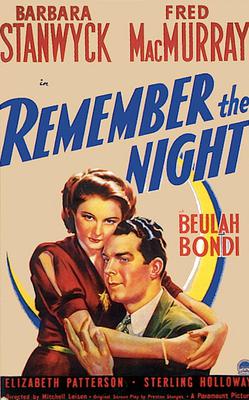Pages
▼
Monday, February 1, 2016
Remember the Night (Mitchell Leisen, 1940)
Mitchell Leisen directed two films from screenplays by Preston Sturges. The first, Easy Living (1937), is one of the great screwball comedies, in which fat cat Edward Arnold throws his wife's fur coat out of their penthouse window and it lands on penniless Jean Arthur, who is riding by on the top deck of a double-decker bus. Wackiness ensues. But Sturges was so unhappy with what Leisen did with the other script, for Remember the Night, that he decided to direct his own screenplays for then on, resulting in one of the greatest of writer-director careers. He was, however, so delighted with Barbara Stanwyck's performance in Remember the Night that he created one of his best movies, The Lady Eve (1941), for her. Stanwyck and her co-star, Fred MacMurray, are in fact the best thing about Remember the Night, on which Leisen could never find the right handle. It starts as screwball comedy, with Stanwyck playing Lee Leander, a compulsive shoplifter whose theft of a bracelet lands her in court being prosecuted by assistant district attorney John Sargent (MacMurray). It is just before Christmas, and when the judge rules for a continuance until after the holidays, Sargent good-heartedly arranges for Lee to be released on bail rather than spend the holidays in jail. When defendant and prosecutor find that they are both from Indiana, he decides to give her a lift home. Naturally, they fall in love, and not so naturally, the movie falls to pieces. It devolves into a sentimental nostalgia piece, with a few good lines and some nice performances, particularly by Beulah Bondi as Sargent's mother, Elizabeth Patterson as his maiden aunt, and Sterling Holloway as his simple-minded cousin. But the problem is that they have to return to New York and she has to face him as prosecutor, not as fiancé. The Indiana scenes are preposterous: Sargent's family lives on a farm near a small town that seems untouched by the 20th century, a place without electricity where the chief amusements are taffy pulls and barn dances. It's possible that Sturges could have resolved all of this better than Leisen does, but the material needs a consistent touch that the director is unable to provide.
Charles Matthews
